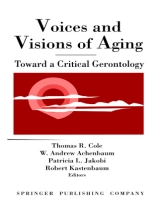A critical gerontology requires more than a simple elaboration of existing humanistic scholarship on aging. This exceptional new work introduces a basis for genuine dialogue across humanistic, scientific, and professional disciplines. Among the topics addressed are industrial employment, retirement, life styles of older women, and biological research. From philosophical reflections on the ìthird ageî to critical perspectives on institutional adaptations to an aging society, this book presents a wide range of provocative thought.
Mục lục
‘
Preface,
Thomas R. Cole
Contributors
Overview: What is Critical Gerontology and Why Is It Important?,
Harry R. Moody
Part I: Theory/Epistemology/Method
Critical Perspectives on Retirement, Robert C. Atchley Aging as Explanation: How Scientific Measurement Can Advance Critical Gerontology, Fred L. Bookstein and W. Andrew Achenbaum Voice and Context in a New Gerontology, Jaber F. Gubrium Evolutionary Gerontology and Critical Gerontology: Letís Just Be Friends, Michael R. Rose Criticism between Literature and Gerontology, Steven Weiland Part II: Humanistic Gerontology
Aging, Morale, and Meaning: The Nexus of Narrative, Bertram J. Cohler Rethinking Industrialization: Old Age and the Family Economy, Brian Gratton and Carole Haber Encrusted Elders: Arizona and the Political Spirit of Postmodern Aging, Robert Kastenbaum Arrested Aging: The Power of the Past to Make Us Aged and Old, Laurence B. Mc Cullough Scenes from Primary Care: A Dream in Two Acts, William, F. Monroe in collaboration with Tomas R. Cole Free to Die: Afterthoughts on Primary Care, Ronald A. Carson Part III: Political Gerontology/Ideology Critique
Toward a Philosophy of the Third Age, Charles J. Fahey and Martha Holstein Definitional Ceremonies: Depoliticizing and Reenchanting the Culture of Age, Marc Kaminsky Justice and Mother Love: Toward a Critical Theory of Justice Between Old and Young, Nancy S. Jecker The Lives of Older Women: Perspectives from Political Economy and the Humanities, Beverly Ovrebo and Meredith Minkler Acknowledgments
Index
‘












